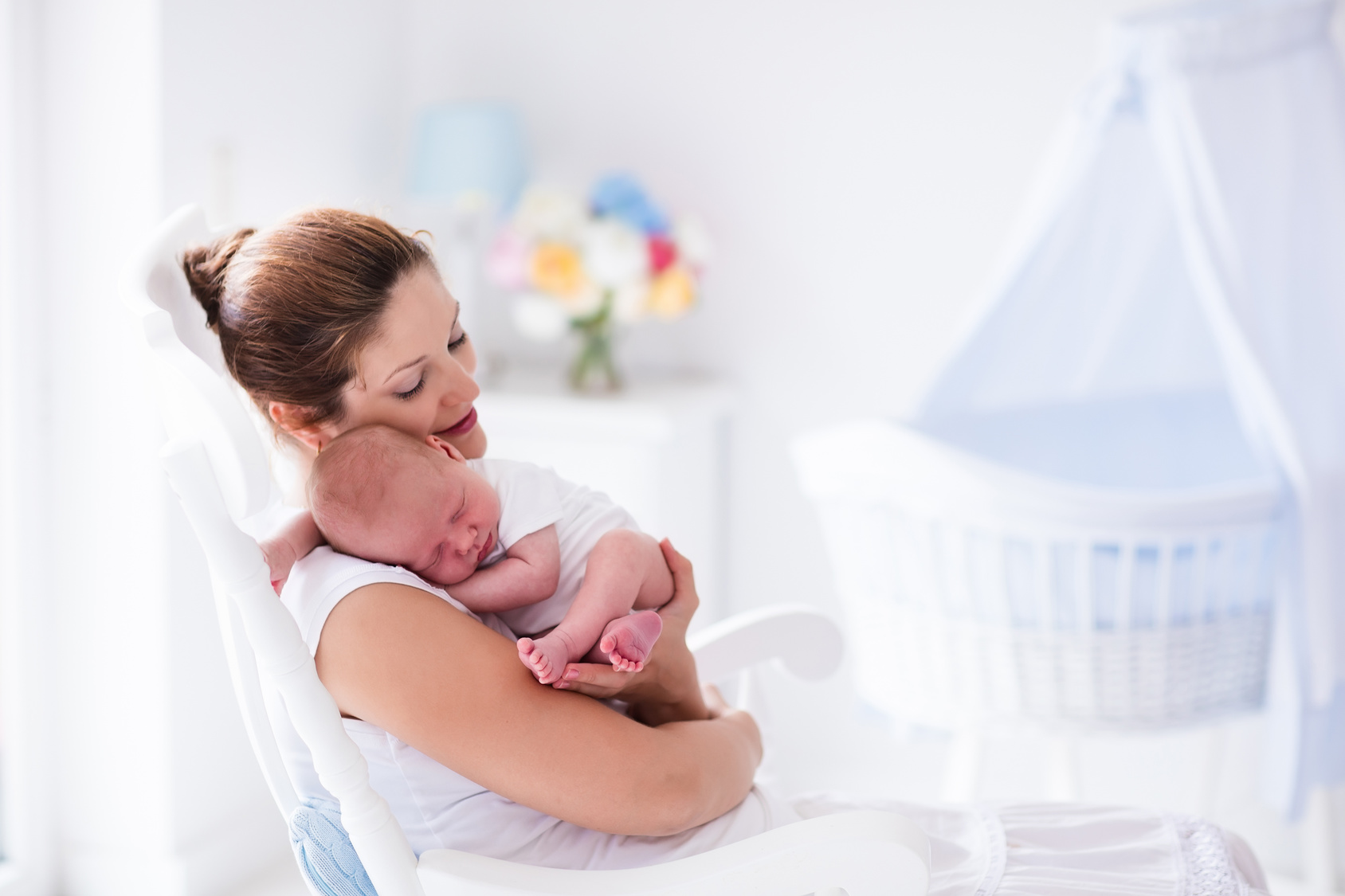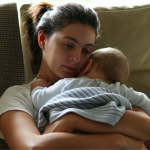It is well-established that women with a history of bipolar disorder or postpartum psychosis are at extremely high risk of postpartum psychiatric illness. Several studies have indicated that lithium prophylaxis can dramatically reduce the risk of postpartum relapse; however, the studies have varied in terms of the timing of prophylaxis, with some initiating treatment during pregnancy and others initiating treatment immediately after delivery. A recent study published in the American Journal of Psychiatry gives more information on the clinical management of these high risk populations.
Between 2003 and 2010, 70 pregnant women at high risk for postpartum psychosis were referred for evaluation. Psychiatric diagnoses were established using a semi-structured interview by a psychiatrist and review of the medical records. Included were women with bipolar I or bipolar II disorder (n=41) and women with a history of postpartum psychosis without any manic or psychotic symptoms outside of the postpartum period (n=29).
Women who were medication free were advised to start lithium prophylaxis immediately after delivery. Those already taking lithium during pregnancy were advised to continue treatment after delivery.
Emphasizing the importance of sufficient sleep during the postpartum period, all women were advised to spend the first week postpartum on the inpatient obstetric ward, where nurses performed the overnight newborn feedings. Low dose lorazepam was used to manage sleep problems. Furthermore, the women were advised against breastfeeding. The women were evaluated every 4–6 weeks for a minimum of 4 weeks (range=4–52 weeks). The mean period of follow-up was 12.6 weeks postpartum.
Relapse in Women with Histories of Postpartum Psychosis
The timing of relapse was substantially different between the women with bipolar disorder versus those with a history of postpartum psychosis only. All of the women with postpartum psychosis were medication-free throughout the entire pregnancy, yet none of those 29 women relapsed during pregnancy.
During the postpartum period, 20 of the 29 women with histories of postpartum psychosis were treated prophylactically: 17 with lithium and 3 with antipsychotic medications. None of the 20 women receiving prophylaxis relapsed. Nine of the women chose not to pursue prophylaxis. Four of these women (44.4%) relapsed: one with mania, one with psychosis, one with mixed symptoms, and one with depression. Symptoms in three were severe enough to warrant psychiatric hospitalization.
Relapse in Women with Bipolar Disorder
During pregnancy, most of the women (n=31) remained on a mood stabilizer. In contrast to the women with a history of postpartum psychosis only, none of whom had a relapse during pregnancy, 24.4% of the women with bipolar disorder (10 of 41) relapsed during pregnancy. Relapse rates during pregnancy were higher among women who were not taking a mood stabilizer (40.0% or four of 10) than in women who maintained treatment with mood stabilizer during pregnancy (19.4% or six of 31).
Postpartum relapse occurred in 22.0% of the women with bipolar disorder (nine of 41); most of those women (n=6) had already relapsed during pregnancy. Consequently, relapse during pregnancy was a significant risk factor for postpartum illness (odds ratio=14.0).
Recommendations
Based on these findings the authors recommend initiating prophylactic treatment with lithium immediately after delivery in women with a history of psychosis limited to the postpartum period. This approach minimizes exposure to medication during pregnancy but at the same time effectively decreases the risk of postpartum relapse.
On the other hand, patients with bipolar disorder require continuous prophylactic treatment throughout pregnancy and the postpartum period. These women are at high risk for recurrent illness during pregnancy and the postpartum period. Furthermore, relapse during pregnancy significantly increases the risk of postpartum illness. Prophylaxis during pregnancy not only helped to maintain mood stability during pregnancy but also reduced the risk of postpartum illness.
Further studies are required to determine the efficacy of other prophylactic interventison, as most of the women in this study were treated with lithium. Previous studies using other prophylactic strategies in bipolar women either failed to show efficacy, as in the case of valproate (Wisner 2004), or were inconclusive, as in the case of olanzapine (Sharma 2006).
While recent public health initiatives have advocated screening for postpartum psychiatric illness after delivery, this report underscores the importance of assessing risk early on in the pregnancy, or ideally before a woman conceives. This study, and several others, have clearly demonstrated that we can use lithium prophylaxis to actuallyprevent postpartum illness in a women at high risk for postpartum psychiatric illness.
Ruta Nonacs, MD PhD
Bergink V, Bouvy PF, Vervoort JS, et al. Prevention of Postpartum Psychosis and Mania in Women at High Risk. Am J Psychiatry 2012; 169:609-615.
Sharma V, Smith A, Mazmanian D. Olanzapine in the prevention of postpartum psychosis and mood episodes in bipolar disorder. Bipolar Disord 2006; 8:400–404.
Wisner KL, Hanusa BH, Peindl KS, Perel JM. Prevention of postpartum episodes in women with bipolar disorder. Biol Psychiatry 2004; 56:592–596.







This is an important post, and I’m sending it out to my patients. Important points for clinical management of pregnant women:
1. People are used to titrating medication doses based on their current symptoms. With lithium, the hemodilution of pregnancy requires increasing the dose empirically to maintain therapeutic blood levels. It’s hard to convince a pregnant woman to take more medication if she feels well, so it’s important to start talking about prophylaxis early on in the pregnancy.
2. Sleep protection is vital for preventing (and, usually, treating) mood episodes in pregnancy and postpartum.
3. Breastfeeding isn’t for everybody!
Are there citations that indicate breastfeeding contributes to negative psychiatric outcomes, or that the normal protections of breastfeeding against sleep deprivation are not in effect for women with psychiatric issues? It seems like these two recommendations (no breastfeeding or awakening at night) are tacked on based on assumptions rather than valid research. I would be grateful for citations supporting those recommendations as supportive of the other therapies.
It seems to me one would need some fairly substancial studies to suggest such a drastic health trade-off for mother and baby in addition to the medication. Is there a study using the medication but not eliminating normal breastfeeding?
@Susan Lane, What are the “normal protections of breastfeeding against sleep deprivation?”
If a person has postpartum depression the risk of recurrence is 60-70%. In those with a history of psychosis it is prudent to initiate medication prior to delivery. Protection of sleep is vital and seems to be the “canary in the mine”. There are few psychiatrists available to see postpartum patients unless psychosis emerges. Most women are on Medicaid for pregnancy in my state. With some discussion, few women with PP depression will neglect medications prior to delivery. Lithium is not commonly used outside of psychiatry. In pregnancy, the atypicals and lamotrigine, I use clonazepam for sleep, seem to work well. It is close follow up, sleep wake management and when needed a mood stabilizer. The goal is to never have a patient develop psychosis because of good screening along the way.
Most who develop it had treatable signs of faltering mental health. It is my clinical experience as an OB/GYN that I rely on for that statement. Thank you for the excellent article and all the great work; it helps guide the way.
Thanks for your comments and your diligent readership of our posts.
For all those at risk, early detection through anti-natal care, by carrying out general screening is a major aspect in this regard. Midwifes should be trained much on this point so that pregnant mothers are all screened and that they can be identified earlier. In addition, social support is needed towards these mothers in terms of help.
Public health specialist, Uganda